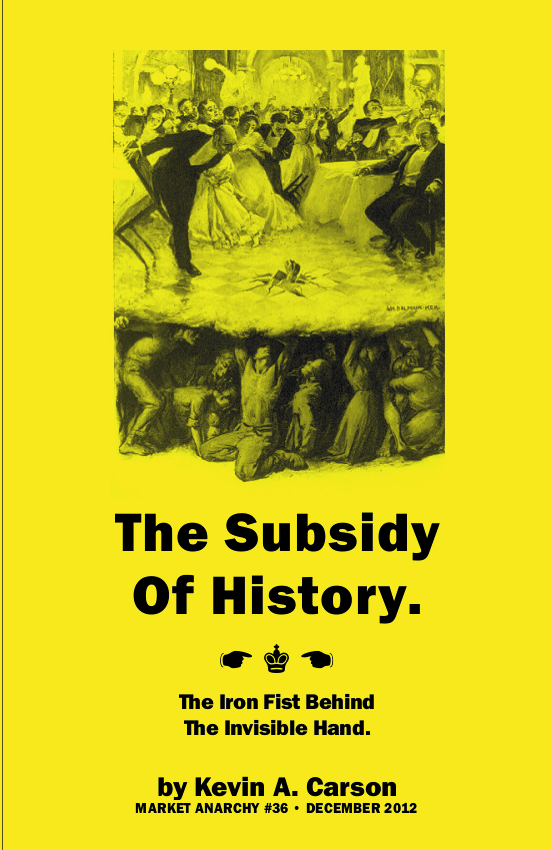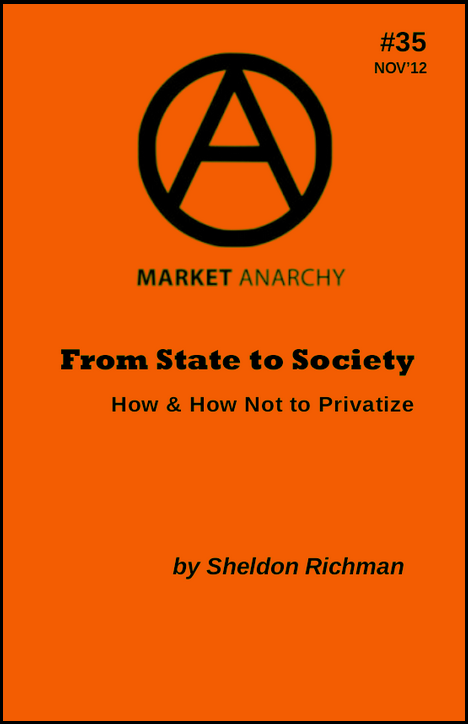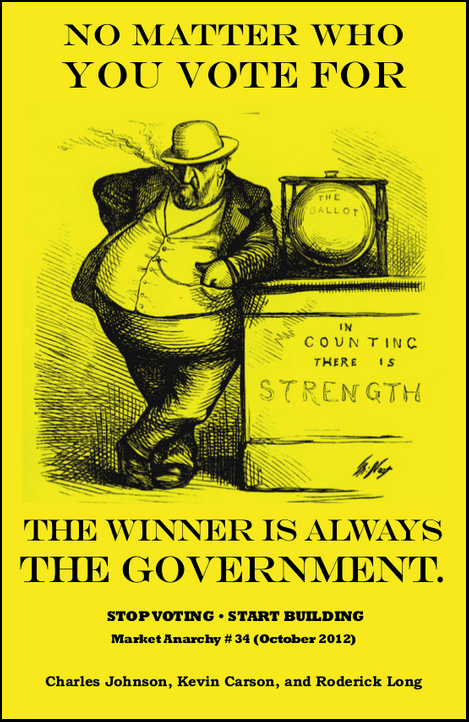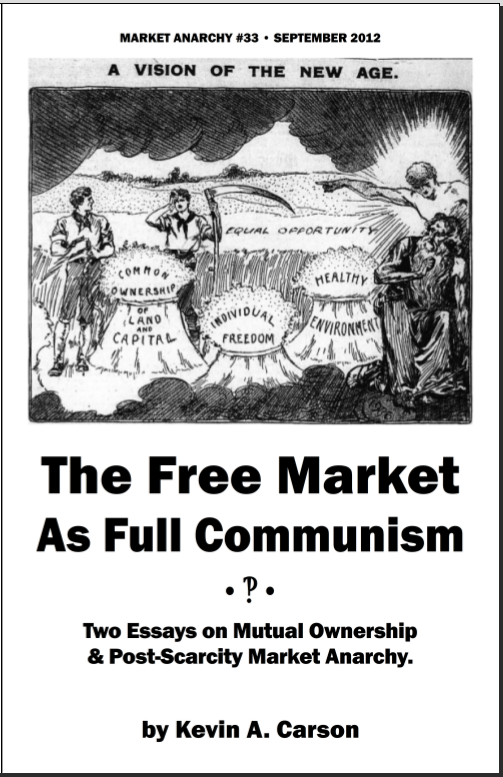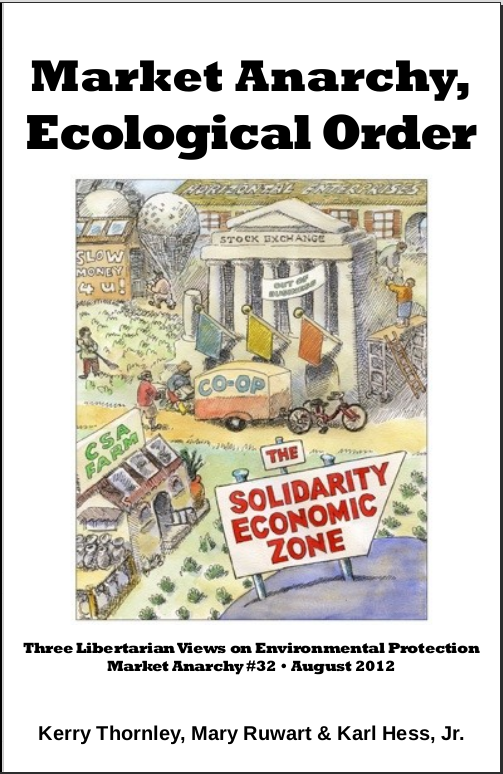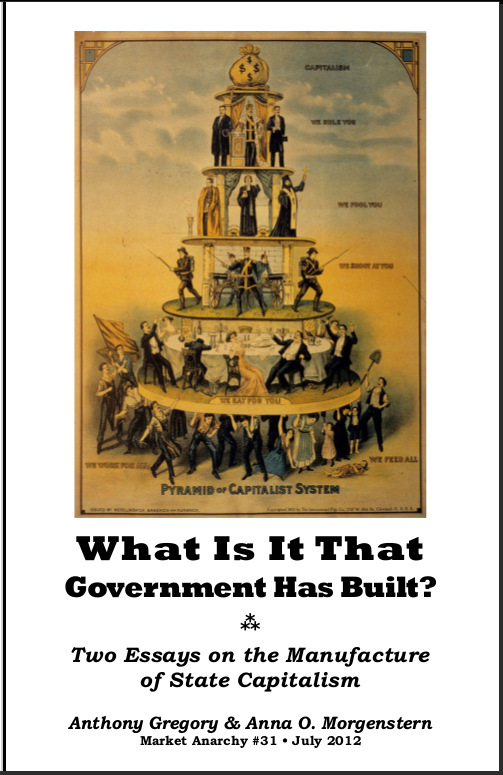The following article was written by Kevin Carson and published on his blog Mutualist Blog: Free Market Anti-Capitalism, May 5th, 2008.
Michael Shermer. The Mind of the Market: Compassionate Apes, Competitive Humans, and Other Tales from Evolutionary Economics (New York: Henry Holt and Company, 2008).
If you can get past the flaws in Shermer’s book (things others might prefer to think of as my fixations, hangups, and dead horses), it’s quite an enjoyable read.
But given my obsession with the ubiquity of vulgar libertarianism, comparable to Captain Ahab’s with Moby Dick, I can’t refrain from pointing out the flaws.
Before I say a lot of nasty things about Shermer’s ideological assumptions, I have to make the disclaimer up front that he comes across as thoroughly decent and likeable on a personal level. That he takes for granted certain ideological assumptions that I have long since declared war on is no reflection on him as a human being. Shermer states, as one of his fundamental guiding principles, a dictum of Spinoza’s: “I have made a ceaseless effort not to ridicule, not to bewail, not to scorn human actions, but to understand them.” I’ll try to keep to that spirit as closely as I can in discussing my caveats about Shermer’s book.
Nevertheless, Shermer displays a considerable vulgar libertarian element in his background assumptions. His writing, over and over, tacitly equates the phenomena of existing corporate capitalism to the “free market.” He constantly uses things like Bill Gates, Wal-Mart, and other transnational corporations to illustrate the principles of the “market,” and treats them as living embodiments of Adam Smith’s invisible hand. He equates “the market” to the existing corporate economy, quoting attacks on the evils of corporate power and then “proving” they can’t be right because “that’s not how the market works.” Implicit in his rejection of The Corporation, of Chomsky and Zinn, is the assumption that the present system, the one they’re attacking, is the market.
A parallel theme is alleged popular hostility or resistance to “free market economics,” which he assumes is motivated by irrationality. A particularly atrocious example (I’m tempted to call it a howler) occurs on page 16:
Folk economics leads us to disdain excessive wealth, label usury a sin, and mistrust the invisible hand of the market. What we do not understand we often fear, and what we fear we often loathe. (As oneNew Yorker cartoon featuring two people in conversation reads: “I hated Bill Gates before it became so fashionable.”)
There you have it: invisible hand = excessive wealth = Bill Gates. Anybody who has problems with Bill Gates and excessive wealth must harbor an irrational fear and/or hatred for “the invisible hand of the market.” After all, it’s not like Gates could have gotten so rich by any other means, like the visible hand of the state’s “intellectual property” [sic] monopoly, could he? And we know all those other billionaires got rich through the operation of the “free market.” I mean, we hear it from neoliberal politicians and commentators at MSNBC every friggin’ day, so it must be true. This all reminds me of Dick Cheney in 2000 boasting, of Halliburton’s wealth, that “Government had nothing to do with it.”
The public mindset isn’t really all that irrational, if you keep in mind that their hostility is not so much to free markets, as to what has been called “free markets” by the usual gang of corporate apologists.
I’m about as close to a free market fundamentalist as you can get. But if I thought the “free market” meant what Tom Friedman and other neoliberal politicians and talking heads meant by it, I’d hate it more than anybody.
The average person sees Wal-Mart, Microsoft, downsizings, oil company profits, offshoring, and all the other unsavory phenomena of the corporate global economy defended in “free market” language, and his response is “if that’s the free market, then the free market be damned.” It’s essentially the same reaction as Huckleberry Finn’s. Huck lacked the conceptual apparatus to make an effective critique of the legitimizing ideology of slavery, or to debunk the Widow Douglas’s “property rights” in Jim. He took the slave system’s ideological self-justification at face value–and then said “All right, then, I’ll go to hell.” The average American, likewise, looks at the inequalities and injustices of our corporatist economic system, made possible by massive state intervention on behalf of organized capital, and sees it defended as the “free market.” And his response is the same: “If this is the free market, I’ll go to hell.”
Shermer asks why people reject Adam Smith’s theory of economics, despite its being so profound and proven. The answer just might be that the rhetoric of free markets, so closely associated with Adam Smith, has been misappropriated to defend a system of corporate power far closer to what Smith condemned than to what he supported. Adam Smith, like the other early classical liberals, was a revolutionary thinker who attacked the entrenched privileges of the landed oligarchy and the mercantile capitalists. It’s almost impossible to go to a mainstream “libertarian” website these days without seeing the thought of Adam Smith misappropriated to defend the modern institution most closely resembling the landed interests and privileged monopolists of the Old Regime: the giant, state-subsidized, state-protected corporation.
As I suggested earlier, most people who display egalitarian reactions against existing inequalities and concentrations of wealth may well believe that what they hate is the “free market.” But that’s only because the rhetoric of “free markets” has been perverted, for the most part, by apologists for those concentrations of wealth which result from privilege and other forms of state intervention. What they hate, they rightly hate. They’re wrong to believe that what they hate is the “free market.” But it’s hard to blame them, when you can’t turn on the TV or read an editorial page without seeing a fundamentally statist economic system of special privilege and protection for big business and the rich described as “our free market system.”
In fairness to Shermer, he sometimes tips his hat to the existence of things like corporate welfare, but for the most part he treats it as a minor deviation from a corporate economy that is, on the whole, a pretty close approximation of the “free market.” If you eliminated the subsidies to military contractors and agribusiness, what you’d wind up with is, in all its essentials, something pretty much like the economy we actually have: a global economy dominated by a few hundred corporations.
For example, he condemns the popular, zero-sum view of foreign trade as an “abandonment of free market principles.” And he cites Nobel laureate Edward Prescott on the foolish popular belief that it’s “government’s economic responsibility to protect U.S. industry….”
But in fact, the overwhelming bulk of the transnational corporate economy is a zero-sum game.
For starters, the main purpose of the World Bank and foreign aid over the past sixty years has been to subsidize the export of capital and offshoring of production from the West, by funding the transportation and utility infrastructure necessary for capital investment overseas to be profitable. The bulk of the U.S. military budget is taken up by the Navy, whose primary purpose is to keep the sea lanes open. No less an authority than Adam Smith argued that such expenses should be borne by those actually engaged in foreign trade. The United States has systematically intervened over the past century to keep landed oligarchies in power, to thwart land reform, and generally–whether by coup or by death squad– to make the world safe for Enclosure. Between this, and the helpfulness of authoritarian regimes in keeping labor docile, supplying sweatshop industry has been supplied with a labor force eager (or rather desperate) to work on whatever terms are offered.
But if that’s for starters, it’s still barely a start. The elephant in the living room is the role of “intellectual property” [sic] in the transnational corporate economy. Despite Prescott’s exasperated lament quoted above, the central function of government in the present system of global trade is to protect transnational capital from competition. One of the most important functions of the GATT Uruguay Round’s industrial property provisions, with their long patent terms, is to lock Western TNCs into control of the current generation of production technology, and thus to prevent the emergence of native-owned competition and lock Third World countries into a permanent position of supplying sweatshop labor and raw materials. It’s also probably not a coincidence that all the profitable sectors in the corporate global economy are those whose business models are dependent either on IP (entertainment and software), direct subsidies (armaments and aviation), or both (agribusiness, biotech, electronics). “Intellectual property” serves exactly the same protectionist function, for transnational corporations in today’s global economy, that tariffs served for the old national industries.
The corporate global economy, in other words, is a statist construct to its very core, and has no more to do with “free markets” than Stalinism had to do with workers’ power. And Shermer explicitly refers to agreements like CAFTA asexamples of “free trade.” The primary practitioners of the “mercantilist zero-sum protectionism” he decries are the transnational corporations themselves. It’s no wonder the public hates “free trade,” if it hears it identified with such practices.
Fortunately, given my background as both a dissident free market libertarian and a dissident libertarian socialist, I’m pretty good at “eating what I want and spitting out the rest,” even when it’s embedded in an ideological framework I disagree with. I’ve had to do this with thinkers ranging from Marx to Mises. And once you get past my hangups, there’s a lot of useful and fascinating material in Shermer’s book, presented in a very engaging manner.
If you enjoy the work of Desmond Morris and similar evolutionary approaches to human social behavior, you should thoroughly enjoy this book. Shermer discusses the apparent irrationalities of human economic behavior, and how the same behavior would make perfect sense from the standpoint of the behaviors selected for in a small primate hunter-gatherer group.
I especially enjoyed his discussions of egalitarianism and reciprocity, and found much of it relevant to the material I posted earlier in draft Chapter Eleven: The Abolition of Privilege.
My main disagreement with Shermer on this subject is with his assumption that such predispositions are contrary to the ideally rational behavior of a utility-maximizing market actor.
He is not entirely wrong on this, of course. There are some ingrained human cognitive biases that do result in irrational behavior.
But for the most part, I believe human instincts for reciprocity and egalitarianism work entirely with the grain of a genuine market. The real-world phenomena that people condemn, on the basis of values of reciprocity and egalitarianism, in fact result from violations of genuine market principles.
In Chapter Eleven, I discussed why I believe a genuine market, absent the zero-sum effects of privilege, would result in a comparatively egalitarian outcome. The human instincts for reciprocity and egalitarianism do not operate at cross-purposes to the market, but are the behavioral basis for it. Reciprocity and equal exchange are the normal outcomes of a market operating free from interference. People are most likely to say “That’s not fair” precisely when equal exchange has been thwarted, and a zero-sum situation created in its place, by state intervention on behalf of the privileged.
A good example comes immediately after the Bill Gates howler quoted above.
In most countries, [consternation over income polarization] leads to political policy to raise the poor and lower the rich, because during our evolutionary tenure we lived in a zero-sum (win-lose) world, in which one person’s gain meant another person’s loss….
Today, however, we live in a nonzero world….
Um, no. We would live in a nonzero world, if we actually had a free market. What we have, however, is a system of political capitalism in which the state has systematically intervened in the market to raise the rich and lower the poor; to subsidize the operating costs of big business; to enforce artificial property rights like patents and copyright, and absentee titles to vacant and unimproved land that ought to be open to homesteading; and otherwise to protect giant corporations from the competitive dangers of a genuine market. In such an environment, it’s entirely reasonable to believe that fortunes in the billions or hundreds of millions have been acquired at somebody’s expense. It’s entirely reasonable, when you see a turtle on a fencepost, to suspect he didn’t climb up there on his own.
I hope my Van Helsinglike fixation on the vampire of vulgar libertarianism hasn’t obscured the real value of this book. Even if I just can’t let the neoliberal ideology go, it’s really not central to the book. What is central is the evolutionary roots of human economic behavior, a subject on which Shermer provides a wealth of information. The information itself, for the most part, can stand by itself without regard to Shermer’s ideological framework. I found much of it, particularly the parts on reciprocity and egalitarianism, to be quite useful–although perhaps not for the purposes the author intended. At any rate, I thoroughly enjoyed reading it. And if I could enjoy it, with my neurotic obsessions, surely any normal person will enjoy it that much more.



